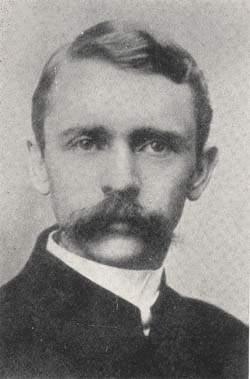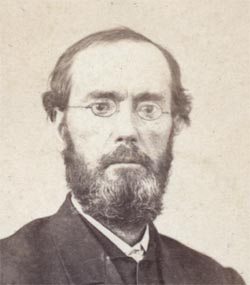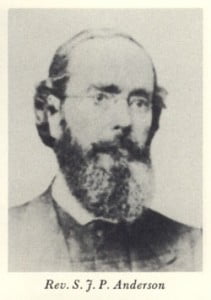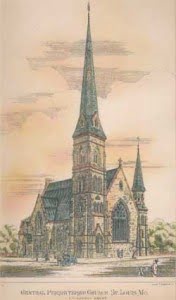Pray for Repentance and for Reformation
Where feasible, it seems fitting to include some portion of a sermon on our Sunday entries. To get there today, we’ll start from volume 1 of Sprague’s ANNALS, where we find this account of the Rev. William Hill:
“William Hill, the son of Joseph and Joanna (Read) Hill, was born in Cumberland County, Virginia, on the 3d of March, 1769. His ancestors were from England. He lost his father when he was five years old; and, after the lapse of a few years, his mother gave him a stepfather in Mrs. Daniel Allen, father of the Rev. Carey Allen, and an elder in the Presbyterian Church in Cumberland County, at that time under the pastoral care of the Rev. Samuel Stanhope Smith. At the age of eleven, he lost his mother, who seems to have been a devout and exemplary Christian, and to have made impressions upon the mind of her son in favor of a religious life, that had a powerful influence in ultimately determining his character. One year previous to this, he was placed under the tuition of Mr. Drury Lacy, who, for three years, was employed by Mr. Allen as a teacher in his family. After his mother’s death, he was placed under the guardianship of one who cared little for religion, and under whose influence he soon lost his serious impressions, and became absorbed to a great extent, in the pleasures of fashionable life.
“This habit of carelessness, however, was not destined to be of long continuance. In 1785, he entered Hampden Sydney College, then under the Presidency of the Rev. John Blair Smith. So low was the state of religion in the College at that time, that there was not a student who evinced any regard for it, nor one who was known to possess a Bible. During the early part of his collegiate course, he endeavored to banish all thoughts of religion, and indulged freely in the views common to his ungodly associates; but even then he had his moments of reflection when he was haunted by the remembrance of his mother’s counsels and prayers. Nearly two years elapsed, after he entered College, before his character seemed to undergo a radical change. After his mind had, for some time, been turned inward upon itself in silent and anxious thought, he retired to a secluded spot, where he gave vent to the agony of his spirit in earnest cries to the Divine mercy, and was enabled, as he believed, to devote himself without reserve to the service of God.
Shortly after, two or three other young men connected with the College experienced a similar change of views and feelings, and associated themselves with him in a private devotional service, which, as it became known, excited the most bitter opposition from their fellow students, and even drew forth threats of vengeance, unless it were discontinued. This brought the matter to the ears of the President, who assured them not only that they should be protected in their rights, but that they should have the privilege of holding their meeting in his parlor, and that he would himself be present and assist in conducting it. A revival of religion now commenced, which soon included among its subjects half of the students in College…The revival extended into neighboring churches, and then into those which were more remote, and was more extensive and powerful than had been experienced in Virginia since the days of President [Samuel] Davies.”
It breaks our preconceptions to read that times then were not much different than today. Unbelief, atheism and the persecution of those who desire to live godly lives, these things were just as much a part of early American history as they are today. God brought reformation and revival then, and He can so bless again.
It was during the summer of 1787 that William Hill made a public profession of his faith in Christ as his Savior. In 1790 he was licensed to preach, and after serving a term as a missionary, took the pulpit of the Presbyterian Church in Winchester, Virginia in 1800. It was there in 1812 that he preached a sermon in reflection on what has been termed early America’s first great disaster. Late in 1811, a great fire had swept a theater in Richmond, VA, trapping many of the theater-goers and killing 72. The nation mourned, and Rev. Hill was one of many who delivered a sermon in retrospect of that tragedy. A portion of his sermon follows, with a link at the end for those who may want to read the full sermon.
SERMON, &c.
Luke XIII.–1st and r5th inclusive.
“There were present at that season some that told him of the Galilaeans, whose blood Pilate had mingled with their sacrifices. And Jesus answering said unto them, Suppose ye that these Galilaeans were sinners above all the Galilaeans, because they suffered such things? I tell you, Nay: but, except ye repent, ye shall all likewise perish. Or those eighteen, upon whom the tower in Siloam fell, and slew them, think ye that they were sinners above all men that dwelt in Jerusalem? I tell you, Nay: but, except ye repent, ye shall all likewise perish.”
The Blessed Saviour in the close of the last chapter had just mentioned what would be the dreadful doom of obstinate and impenitent sinners, who, when in the hands of their adversary, and about to be hauled before their Judge, should still neglect to make their peace with him.–This induced some person present to mention the case of those Galileans, whose blood Pilate had mingled with their sacrifices, as a case supposed to be in point. The Saviour, as was his custom, took an occasion, from the relation of that barbarous act, to deduce a pious improvement, and to impart useful instruction.
By referring to another passage of Scripture, and to the Jewish historian Josephus, we learn the occasion of this cruel deed. These persons, slain by Pilate, the procurator of Judea, were some of the faction of Judas of Galilee, mentioned by Gamaliel in the 5th Chap. of the Acts of the Apostles, and more at large by Josephus. This Judas had stirred up the Galileans to sedition against the Roman government, under a pretense of asserting their liberty, by freeing them from the Roman tribute; and some of them coming to Jerusalem, to sacrifice according to the custom of the Jews, at the Passover, Pilate caused them to be slain upon the spot, while they were engaged in offering up their sacrifices, shedding their blood, with that of their beasts, which they were slaying for the altar.
Our Saviour takes occasion from the relation of this event, to correct a very vicious humor, which has always raged in the world, that of censuring the faults of others, while we overlook our own.
The principle of self-love which was inherent in man, has, by our apostasy degenerated into self-flattery, so that it has now almost become natural in man, to supply the want of a good conscience, by a good opinion of themselves. And hence it comes to pass, that men are so ready to take all advantages to confirm themselves in that false peace, which they have created to themselves in their own imagination; and so they can but maintain a comfortable opinion of themselves, it matters not how uncharitable they are to others; and knowing no better way to foster this fond conceit of themselves than by fancying God to be their friend, it hence comes to pass, that they are so apt to interpret the providence of God towards others in favor of themselves, and to abuse the judgments which fall upon their neighbors, into an argument of their own comparative innocence.
Therefore, our Saviour, who knew what was in man, and what kind of conclusions men are apt to draw from such occurrences of Providence as are before us, endeavors in the first place to prevent the bad use which they were apt to make of them. “Suppose ye,” says he, “that those Galileans were sinners, above all the Galileans, because they suffered such things? I tell you, nay.”
To this instance of the Galileans, he adds another still stronger. Pilate might be represented as a tyrant, and the best of men are liable to suffer, by the cruel hand of oppression. But he now mentions an occurrence of a recent date, and well known to all at Jerusalem, which proceeded immediately from the hand of God, without the agency of man. “Those eighteen upon whom the tower in Siloam fell, and slew them, think ye that they were sinners above all that dwelt at Jerusalem? I tell you nay.”
And having thus anticipated the censuring of others, our Saviour proceeds to awaken his hearers to a consideration and care of themselves. “I tell you nay; but except ye repent, ye shall all likewise perish.”
The general sense of which words, is, that impenitency in sin, will certainly be the ruin of men sooner or later. It will bring great mischiefs upon them in this world; but however that may be, it will infallibly plunge them into inconceivable misery in the next. But besides the certain denunciation of misery and ruin to all impenitent sinners, which is the largest sense of the words, and analogous to many other declarations of Scripture, it is probable that our Saviour, in the present instance, more immediately referred to those temporal calamities which were shortly to befall the Jews; and by way of prediction, foretold what would be the fate of that whole nation, if they continued impenitent. There is a peculiar force in the [Greek] word [in our text] which means something more than merely, likewise, or also, as it is rendered in our translation. It means literally, “except ye repent, ye shall all perish in like manner,” i.e., besides the vengeance of another world, a temporal judgment as sad as those just alluded to, and not much unlike them, shall come upon this whole nation; which awful prediction was soon after fulfilled at the siege and sack of Jerusalem, by the Roman army of Titus.
The pious and useful reflections, suggested by the subject under consideration, would also very naturally arise from the late awful visitation of Richmond which has shrouded that city in gloom—thrown our legislatures into mourning, and suspended the voice of melody and song. The dreadful scene forbids all attempts at painting it, for it would actually beggar all description. It is true our friends and fellow citizens have been arrested—suddenly arrested—in an hour of thoughtless gaiety and mirth.—Many—Ah! many have fallen victims to devouring flames; without previous reflection hurried to a judgment bar, and to a destiny henceforth unalterable. And are we to conclude, that they were the guilty, and we the innocent? Our Saviour cautions us from drawing such a conclusion, but assures us, “that except we repent, we shall all likewise perish!”
From the text and occasion thus explained, let us consider two things.
1st. The wrong use and censorious conclusions which men are apt to draw from signal judgments of God upon others.
2nd. The right use which we should make of these things; which is, to reflect upon our own sins, and repent of them; lest the like, or great judgments overtake us….
and Rev. Hill concludes his sermon:
…Be assured we have not been called to repentance and reformation too soon. God knows, the state of religion, of morals, & manners is gloomy enough among us; we have enough to repent of, enough that calls aloud for reformation. May we not hope we are already sensible of it! Let us then show our sincerity by our conduct—use all our influence from our standing in society and from the stations we may fill, to suppress vice and impiety in every shape; and to approve ourselves to our Maker. Other places have been sorely visited and have sorely suffered. Sin, no doubt, has been the procuring cause of all our sufferings.
To read the full sermon, click here.
Sprague, William, vol. 3, p. 563-564.
To read more about the Richmond fire and a recent book written about that tragedy, click here.
 Rev. A. R. Cocke, D.D. was ordained by Lexington Presbytery January 19, 1881. He came to the Windy Cove Presbyterian church directly from the Seminary. He was an A.B. graduate of Washington and Lee University and also a graduate of Union Seminary, Richmond, Virginia. He served as pastor at Windy Cove from 1881-1884. The Presbyterian Church at Millboro was organized during his pastorate.
Rev. A. R. Cocke, D.D. was ordained by Lexington Presbytery January 19, 1881. He came to the Windy Cove Presbyterian church directly from the Seminary. He was an A.B. graduate of Washington and Lee University and also a graduate of Union Seminary, Richmond, Virginia. He served as pastor at Windy Cove from 1881-1884. The Presbyterian Church at Millboro was organized during his pastorate.


